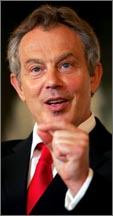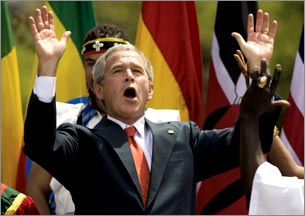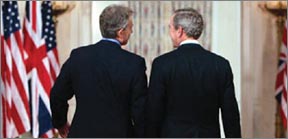Blair's fear over Bush 'poodle' label revealed
  Tony Blair has felt unable to pick up his US Congressional Gold Medal
of Honour for four years partly because the ceremony would reinforce the
prejudices of those convinced he was "some sort of poodle", says Sir
David Manning, Britain's Ambassador in Washington. Tony Blair has felt unable to pick up his US Congressional Gold Medal
of Honour for four years partly because the ceremony would reinforce the
prejudices of those convinced he was "some sort of poodle", says Sir
David Manning, Britain's Ambassador in Washington.
The Prime Minister's 1,351-day delay in collecting the medal from
President Bush has long been a source of puzzlement in both Washington
and London. Downing Street insists that it is still being designed.
But as Mr Blair prepares to leave office, Sir David told The Times in
a rare interview that the Prime Minister "always had inhibitions" about
being handed a medal that was awarded shortly after the invasion of Iraq
at his triumphant address to both houses of Congress in July 2003.
Sir David - who was Downing Street's chief foreign policy adviser in
the run-up to the invasion - seeks to tackle perceptions about Britain's
relationship with America and that between the two leaders, whose place
in history is likely to be defined by the Iraq war.
"For those who are convinced that the Prime Minister is . . . some
sort of poodle, it does not matter what he does," says Sir David, who
will finish his four-year stint as Ambassador this autumn. "You reach
the point where if he had collected the medal, people would say that
proves their point. But it's a much better - a much more complicated
relationship - it's a two-way street."
Speaking from his Lutyens-designed residence in Washington, he says
the relationship between the two countries has not "become more unequal"
in recent years, because since the Second World War, America has been
the world's pre-eminent power" while Britain has had to learn to
"operate as a medium-sized power".
But he accepts that anti-American sentiments have been fuelled by
events that serve to undermine the sense of shared values between Europe
and the US. Sir David says when he arrived in Washington, "my impression
was that the politics was still very much the politics of 9/11".
 But that changed with November's midterm elections when the Democrats
were swept back into power on Capitol Hill. "What we have now is a very
different Congress and a very different political debate - not
everything is about national security and Iraq. But that changed with November's midterm elections when the Democrats
were swept back into power on Capitol Hill. "What we have now is a very
different Congress and a very different political debate - not
everything is about national security and Iraq.
Of course in 2008, Iraq will be a central issue but politics is back
in America after being anaesthetised for a four or five-year period.
"I think that is healthy and a good thing that will play into
perceptions of the US overseas. The debate they are going to have will
be much more recognisable to European public opinion." He is troubled by
the rise of anti-American attitudes, saying it "would just be folly to
turn away from the US" and try to tackle global challenges alone.
"It does scare me and I hope that it will correct itself the further
we get away from post-9/11 politics and the co-operative multilateral
relationship reasserts itself." Such comments might be interpreted as
suggesting that Britain's ability to wield influence in Washington has
been hobbled.
That perception appeared to have been confirmed earlier this year by
Kendall Myers, a US State department official, who described the
relationship with Britain as utterly one-sided where Mr Blair's views
are routinely ignored.
But Sir David insists that the Prime Minister, because of Britain's
long-term interests, would "have had to work closely with whoever was in
power" - as he did with President Clinton.
Indeed, the Ambassador says there have been many occasions when
Britain has made plain its differences with the Bush Administration. He
cites America's detention of terror suspects at Guantanamo Bay and its
scepticism about scientific evidence for climate change, as well as Mr
Blair's commitment to a Middle East peace settlement and his
multilateralist view of the world.
"What is crucial in the relationship is that when we take different
positions it does not affect overall co-operation," he says. "There has
been a subtler process of engagement across a range of issues - how do
you handle proliferation, particularly that of Iran? How do you handle
climate change?
"These are not necessarily easy issues in this country but, by having
the debate I have no doubt we have influenced them." He suggests that
what Condoleezza Rice, the US Secretary of State, is now doing with the
latest Middle East peace initiative involving Arab countries "is very
much what we would be urging them to do", while there has also been a
"slight shift" in Mr Bush's attitude on climate change "where we have
had influence".
The "cartoon-like interpretation of Bush in some quarters" clearly
irritates Sir David, who says the image of the President as a
unilateralist who ignores other countries is based primarily on the
experience of Iraq. This, he says, ignores more recent efforts by the
Administration to work closely with the UN and Europe, as well as China
and Russia, on tackling nuclear threats posed by North Korea and Iran.
A small, bespectacled and softly spoken man, Sir David is held in
huge esteem within Washington where - both as Mr Blair's foreign policy
adviser and as ambassador - he is probably the best-informed witness of
the two leaders' relationship.
For critics of the Prime Minister, this appeared to be summed up by
last year's embarrassing "Yo, Blair" moment at the G8 summit when
neither of them realised a microphone had been left on as the President
appeared to dismiss out of hand Mr Blair's offers of help on the Lebanon
crisis.
Sir David rejects such interpretations, saying: "The President has
own joky way with people . . . he is naturally ebullient. I think it was
like a Texan saying 'Howdy'."
So what is it really like when they meet in private? "It's frank,
very plain," he says. "Both of them know what they want to emphasise and
where they want the conversation to go. They have become comfortable
about dealing with the difficult things as well as the easy things."
www.timesonline.co.uk |
